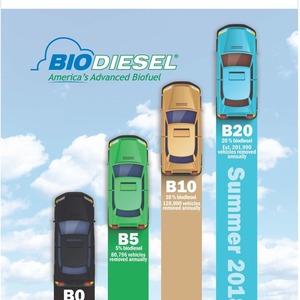Minnesota Biodiesel Task Force to meet June 9 on B20 mandate

Image: Minnesota Soybean Research & Promotion Council
May 23, 2017
BY Ron Kotrba
Minnesota’s Biodiesel Task Force is scheduled to meet June 9 in Saint Paul to discuss whether statutory conditions have been met in order to move the state’s biodiesel mandate from 10 to 20 percent on May 1, 2018.
Task force members will be asked to provide reasons why they believe statutory conditions have or have not been met. If any member believes conditions have not been met, they are asked to provide possible solutions as to what the task force and state should do to ensure the conditions are met in the coming year.
The four conditions required by Minnesota law to be met in order to progress to the next mandated content level of biodiesel in the state’s diesel fuel supply are:
1) an ASTM specification or equivalent federal standard exists for the next minimum diesel-biodiesel blend;
2) a sufficient supply of biodiesel is available and the amount of biodiesel produced in this state from feedstock with at least 75 percent that is produced in the U.S. and Canada is equal to at least 50 percent of anticipated demand at the next minimum content level;
Advertisement
Advertisement
3) adequate blending infrastructure and regulatory protocol are in place in order to promote biodiesel quality and avoid any potential economic disruption; and
4) at least 5 percent of the amount of biodiesel necessary for that minimum content level will be produced from a biological resource other than an agricultural resource traditionally grown or raised in the state, including, but not limited to, algae cultivated for biofuels production, waste oils, and tallow.
In January, the Minnesota Department of Agriculture issued its annual report on biodiesel to the state legislature, in which MDA lays out how the state is prepared to transition to B20.
In response to the report, Brett Webb, the director of commercial development for Flint Hills Resources, wrote to MDA in disagreement of the department’s findings.
“Flint Hills Resources, as a member of the Minnesota Biodiesel Task Force, respectfully disagrees with some of the report’s conclusions, including whether the statutory conditions have been met to move forward with increasing the mandate to B20, which would be by far the highest biodiesel blend required in the United States,” Webb wrote.
In addition to owning several oil refineries, including one in Minnesota, Flint Hills Resources also owns ethanol production capacity and is a partner with Benefuel in joint-venture ownership of the Duonix biodiesel plant, a 50 MMgy production facility in Beatrice, Nebraska.
Advertisement
Advertisement
“We are concerned that the adoption of the B20 requirement next year could prove problematic, harm consumers and erode consumer confidence in the fuels we produce and market, including biodiesel,” Webb continued. “We believe some of the required statutory conditions for mandating B20, as well as several practical issues, also remain unresolved.” These concerns include everything from adequate supply and blending infrastructure to vehicle warranty and cold weather issues.
Task force members are charged with helping the state carry out its biodiesel mandate, but in the letter, Webb voiced opinion on the role of government subsidies, incentives and mandates for biodiesel.
“Flint Hills Resources believes biofuels, including biodiesel, can compete in the marketplace without subsidies, incentives or government mandates,” Webb stated. “Higher biodiesel blends, including B20, are already available in the marketplace and being chosen freely by consumers when cost and seasonal factors make it a competitive and practical option. Mandating the use of B20 in Minnesota, however, as outlined above, is another matter.”
To view the report and Webb’s letter, click here.
A decision will be made in August on whether statutory obligations have been met in order to move forward with B20 as planned on May 1, 2018, or if further action must be taken.
Click here for more information about the meeting.
Related Stories
CoBank’s latest quarterly research report, released July 10, highlights current uncertainty around the implementation of three biofuel policies, RFS RVOs, small refinery exemptions (SREs) and the 45Z clean fuels production tax credit.
The U.S. EPA on July 8 hosted virtual public hearing to gather input on the agency’s recently released proposed rule to set 2026 and 2027 RFS RVOs. Members of the biofuel industry were among those to offer testimony during the event.
The USDA’s Risk Management Agency is implementing multiple changes to the Camelina pilot insurance program for the 2026 and succeeding crop years. The changes will expand coverage options and provide greater flexibility for producers.
President Trump on July 4 signed the “One Big Beautiful Bill Act.” The legislation extends and updates the 45Z credit and revives a tax credit benefiting small biodiesel producers but repeals several other bioenergy-related tax incentives.
CARB on June 27 announced amendments to the state’s LCFS regulations will take effect beginning on July 1. The amended regulations were approved by the agency in November 2024, but implementation was delayed due to regulatory clarity issues.
Upcoming Events










